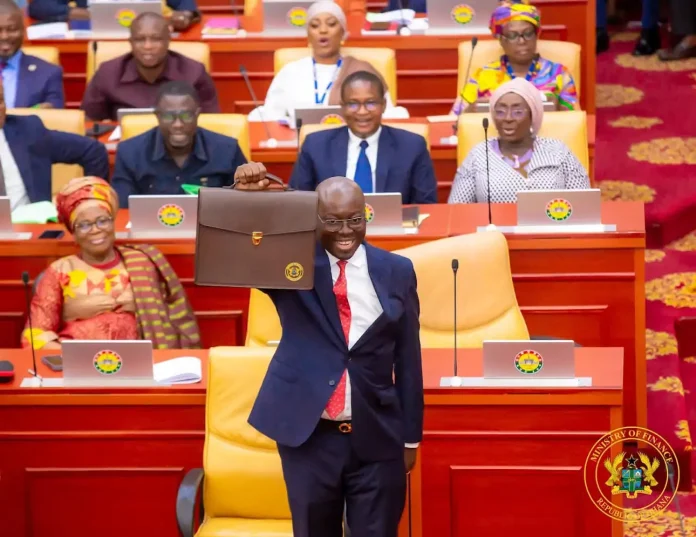Ghana’s Finance Ministry has kicked off stakeholder consultations for the 2026 National Budget, emphasizing private sector growth and job creation as the country transitions from economic stabilization to expansion mode.
The two day pre-budget engagement brought together banking institutions, non-bank financial companies, academics, think tanks, and professional bodies in what Deputy Finance Minister Thomas Nyarko Ampem described as an effort to create an inclusive national document that reflects diverse economic interests. It’s mandated by Section 21 of the Public Financial Management Act, but it’s also smart politics and sound economics at a moment when Ghana needs consensus around fiscal priorities.
Mr. Ampem framed the consultations as essential to ensuring the final budget becomes something stakeholders can own and implement, not just a government wish list imposed from above. That’s significant language. Ghana’s economic trajectory over the past few years has been turbulent enough that building broad buy-in for fiscal policy matters more than usual.
The Ministry says these engagements will directly shape resource allocation and policy design across manufacturing, infrastructure, and social development sectors. If that sounds familiar, it’s because similar consultations preceded the 2025 Budget, which officials credit with helping drive Ghana’s current macroeconomic improvements.
Those improvements are worth noting. Inflation has dropped to 9.4 percent, treasury bill rates have fallen by 1,300 basis points, and the cedi has appreciated alongside improved sovereign credit ratings. Ghana achieved a primary balance surplus in the first half of 2025, exceeding targets and signaling fiscal discipline is taking hold after years of deficits and debt concerns.
But here’s where it gets interesting. The Ministry claims public debt stands at 46.8 percent of GDP as of August 2025, which would represent remarkable progress. However, that figure deserves scrutiny. The International Monetary Fund projects Ghana’s debt to GDP ratio at 59.1 percent by year end, while Bank of Ghana data showed 44.9 percent as of July. The discrepancy matters because debt sustainability remains central to Ghana’s economic credibility and its relationship with international lenders.
Mr. Ampem emphasized that current achievements are foundations for sustained recovery, not endpoints. The 2026 Budget, expected in November, will reportedly focus on sustainable stabilization, fiscal discipline, infrastructure expansion, and social equity, with particular emphasis on youth employment and skills development.
On infrastructure, the government plans to more than double road funding, with over 60 projects currently underway nationwide. Healthcare, education, and social protection programs targeting vulnerable groups will also see increased allocations, according to the Deputy Minister.
What’s notable is the rhetorical shift from crisis management to growth orientation. Ghana spent much of the past few years in damage control mode, managing debt restructuring, negotiating with the IMF, and trying to stabilize the currency. Now officials are talking about expansion, productivity, and opportunity creation. Whether the fiscal space exists to deliver on those ambitions without compromising hard won stability remains an open question.
Financial institutions at the consultation reportedly emphasized the need to maintain fiscal discipline while accelerating contractor payments, streamlining taxes, and supporting small and medium enterprises. That’s the perennial balancing act: businesses want government to spend money owed to them and reduce their tax burden, while also maintaining the fiscal discipline that keeps inflation low and the currency stable. Squaring that circle requires either impressive revenue growth or difficult tradeoffs.
Economists and development experts commended the Ministry for maintaining stakeholder dialogue, noting that such consultations build trust and enhance policy coherence. That’s true enough, though consultations also create expectations that budgets must then meet. If stakeholders feel their input gets ignored once the budget reaches Parliament, the trust building exercise becomes counterproductive.
The real test will come when the 2026 Budget gets tabled in November. Will it balance the competing demands of infrastructure investment, social spending, private sector support, and fiscal discipline? Can Ghana sustain its macroeconomic improvements while accelerating growth and job creation? And will the debt trajectory continue improving in ways that satisfy both domestic stakeholders and international creditors?
For now, the consultation process signals that Ghana’s economic managers understand they need broad support for the next phase of fiscal policy. Whether they can deliver a budget that satisfies competing interests while maintaining economic stability will determine if this inclusive approach produces results or just generates expectations that can’t be met.
Mr. Ampem’s assertion that government remains steadfast in building a resilient economy delivering opportunity for all Ghanaians sounds aspirational. The November budget will show whether that aspiration translates into concrete, fundable policy.
Source: newsghana.com.gh











